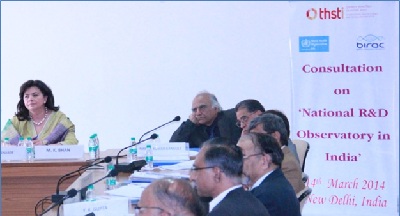
WHO Country Office for India organized a consultation on the National Research & Development Observatory in India on 14 March 2014 at New Delhi, India, in collaboration with Biotechnology Industry Research Assistance Council (BIRAC) and Translational Health Science and Technology Institute (THSTI).
Secretaries of several government research agencies like Department of Biotechnology (DBT), Department of Science and Technology, Department of Health Research (DHR), Biotechnology Industry Research Assistance Council (BIRAC) and Department of Pharmaceuticals (DoP) and many other senior officials and experts participated in the deliberations.
The important issues for considerations were inter alia the structure, mechanisms and possible host institutions for the National Health R&D Observatory mechanism. The outcomes of this consultation would lead to national and regional engagement on Global Health R&D Observatory, one of the key recommendations of the Consultative Expert Working Group on Research & Development: Financing and Coordination (CEWG).
Speaking at consultation, Dr Nata Menabde, WHO Representative to India said, “The National Health R&D Observatory could be a repository which is a virtual single window platform to provide information on all aspects of R&D in India, to facilitate gap identification and priority setting for promotion of innovation and access to affordable health technologies in India.”
The aim of the CEWG was to devise a global strategy on public health, innovation and intellectual property that aims to promote new thinking on innovation and access to medicines, as well as, provide a medium-term framework for securing an enhanced and needs-driven essential health research on sustainable basis for development relevant to diseases which disproportionately affect developing countries, proposing clear objectives and priorities for R&D, and estimating funding needs in this area.
An observational study on methodologies to develop Norms and Standards for Classification of Health R & D needs of developing countries was undertaken by WHO Country Office for India in collaboration with THSTI.
The outcomes of the study were presented in the meeting of experts for developing a strategic work plan as a follow-up of the Consultative Expert Working group (CEWG) in Bangkok, Thailand, from 25-26 July, 2013.
Dr Vijay Raghavan said “The R&D classification will help understand the resource flow and stabilise innovation to design macro level global strategies to improve access and mobilise resources and build capacity. We should create a space in NHRO where we can bring out retrieval of data about areas of major importance.”
Dr T Ramasami added “Structure of the observatory would be a very valuable aspect along with the methods. Dynamic and robust set up in which everyone could connect and contribute into would be ideal for receiving feedback and responses.”
Ms Aradhana Johri said “India exports life-saving drugs to developing countries and also supplies quality drugs to the rich nations at affordable prices. There is a need to foster innovation and R&D in India to enable the Indian pharma industry to be a key player in innovative research.”
Dr GB Nair highlighted the CEWG established under element seven of GSPA (WHA61.21) for promoting sustainable financing mechanisms for stimulating R&D needed by developing countries for health products for Type I, II and III diseases.
“Dispersiblity of funds to Type II and III diseases are insufficient. Quantum of funds allocated for medical devices and biologics are low”, said Dr Nair.
Dr Renu Swarup suggested developing a pilot prototype of the National Research & Development Observatory in India, with the support and collaboration of government research agencies to suggest the way forward.
Several national key opinion leaders like Dr. T.S. Rao, Adviser, Department of Biotechnology, Dr. A.C. Dhariwal, Director, National Vector Borne Disease Control Programme, Dr. N.K. Arora, Executive Director, INCLEN Trust, Dr. Vijay Kumar, Scientist G, Head, Division of Basic Medical Sciences, Indian Council of Medical Research, Dr. Ajay Khera, Deputy Commissioner (Child Health & Immunization), Ministry of Health And Family Welfare (MoHFW), Prof. N. K. Mehra, Dean, Research, All India Institute Medical Sciences, Dr. Y.K. Gupta, Professor and Head Pharmacology, AIIMS, contributed to the deliberations.
